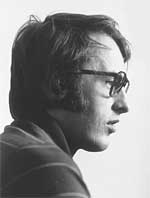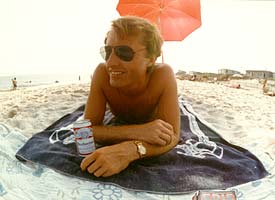Like so
many immigrants I arrived in New York City with
no clear idea of were to go. Less than a month
later I had fallen in love again, this time with
New York. Here is what happened: When I grew
up in Berlin, my parents used to wistfully talk
about the Berlin of their youth in the 1920's,
when for a few short years Berlin was the
cultural capital of Europe: Kurt Weill, The Three
Penny Opera, etc.
I grew up in post-war Berlin, surrounded by
barbed wire (later a wall), the dead-end of the
western world. I was always resentful when they
talked about the old Berlin; I felt that I had
been cheated out of the really good parts.
And then I came to New York, and there was
everything I thought I had been cheated out of:
the cultural and commercial capital of the
western world, an exciting cosmopolitan city,
with people from everywhere doing anything you
could think of with the best theater in the
country, the Mecca of the arts, the center of
business and finance. New York was everything I
had thought I missed out on.
And other than that they spoke English, New
Yorkers were not very different from Berliners.
Berlin was a political island, Manhattan is a
geographical island, so both cities had a clearly
developed sense of "us" and
"them." And like Berliners, New Yorkers
thought they were smarter, funnier and more
sophisticated than the rest of the country, which
in turn considered them arrogant loudmouths.
I realized that I had come home, and I have
never changed my mind. There is a whole section
devoted to
New York.
I had applied to colleges all over the East.
By the time I needed to decide the answer was
clear: I went to Columbia College in New York
City.
Speaking English was never a big problem. I
had learned it in school, and it took two months
of living here before I dreamed my first sentence
in English ("Wait a minute."). There
was the occasional confusion: it took me years to
realize that the "windshield factor"
was really the "windchill factor" ...
By the time I met Beate
23 years later, my German had fallen into disuse.
When she said "Let's speak German" on
our first date, I couldn't get a word out.
I graduated from
Columbia College in 1968 with a degree in
political science and no clue as to what to do
next. I had no male role model; my father and I
had never got along well, he had cut me off when
he realized I was staying in the US, and I had
worked my way through college by doing odd jobs,
like washing down the Haagen-Dasz factory in the
Bronx on Saturdays.
Me
ca. 1970
|
|
|

|
|
So for three years I drifted through
several jobs in the travel industry while
trying to find myself; I just couldn't
think of what to do. Worried that I might
get stuck permanently in travel, I quit
to rethink my life.
|
I
decided that I would try my hand at politics. All
of us who grew up in postwar Berlin had been
taught a high degree of civic responsibility in
school, and it was a lesson that had stuck deeply
with me. At age 26 I decided I would try
politics, so that 40 years later I wouldn't end
up bemoaning the fact that there was this great
unfulfilled passion. Follow the link, if you're
interested in the details of my political career.
After three years in politics as a legislative
and political aide, I realized that I could never
get elected to office in New York. New York
politics is largely ethnic, and Germans are not a
favorite ethnic group. If I was serious about
elective office I'd have to move to some place
like Wisconsin, but to me living in New York was
more important.
I also realized that I didn't want to be a
political aide; I wanted to represent my own
point of view, not someone else's and I didn't
want to be threatened with loss of my job if I
didn't tow the political line. The only
conclusion was to get a business job, so that I
could pursue politics as an independent hobby
from which nobody could fire me.
The only problem was: I still didn't have the
faintest idea of what to do. By now I was in a
panic. I had been through two career attempts, I
was almost 30, and still had no clue.
An acquaintance threw out an aside: "Why
don't you try to become a stock broker ?"
That sounded as good as anything. I was grabbing
for straws. I had seen those tables of numbers in
the newspapers, and they always held a mysterious
fascination. So I made up a resume and went on
interviews. I got a job with Merrill Lynch; they
had the best training program. They hired me,
taught me the difference between a stock and a
bond, gave me a desk and a phone, and I went to
work.
Me
ca. 1980 a long time ago ...
|
|
|

|
|
Two years later a got a
phone call from a headhunter who was
recruiting for Lehman Brothers, where I
spent the next 15 years. The first few
years there were some of the most
formative years of my professional life.
|
I
had a mentor, Bill Welsh, who was the manager and
had been a legendary broker himself. Merrill
Lynch had taught me the nuts and bolts; Bill
taught it to me like an art form. It was like a
medieval apprenticeship; for the next two years I
was a disciple at the feet of one of the great
masters.
In 1990 I joined [firm name]; see my professional page.
